
Time to Speak Russian__Grammar Notes
.pdf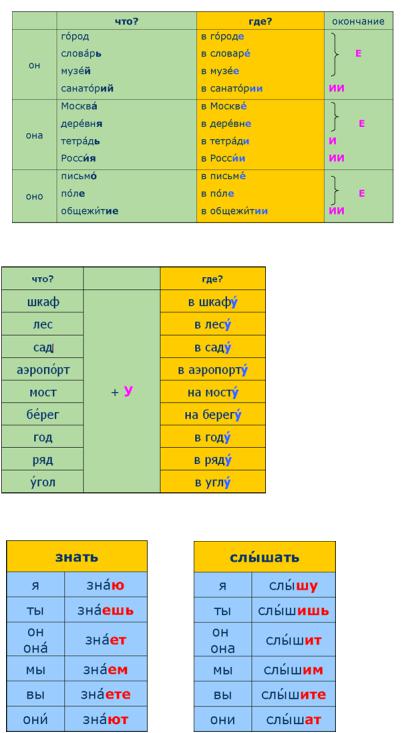
20.06.2015 |
Time to Speak Russian::Grammar Notes |
There is a special group of Russian nouns which have a different ending "y" in the Prepositional case singular. Please, memorize th
Verbs
All Russian verbs are inflected (modified) for person and number. There are 2 sets of verb endings, or 2 Conjugation patterns. The I signaled by endings ть, ти, чь) always remains unchanged. This is the very form you see in a dictionary. In a sentence the verb f it has to "agree" with a person and number of the verb's subject: I, you, he or she, it (singular), we, you, they (plural).
Я знаю. Они знают. Вы знаете.
Please, note that there is one thirdperson singular verbal form for both animate and inanimate subjects of all three genders: masculin "Антон (Anton) работа║ет". "Магазин (a store) работа║ет"."Анна (Anna) работа║ет". "Школа (school) работа║ет". "Радио (ra The thirdperson plural form of a verb will also be the same for inanimate and animate subjects :"Антон и Анна (Anton and Anna) (stores) работа║ют".
Endings of personal verbal forms depend on a verb's conjugation type I or II. Most Russian verbs which in the Infinitive form end i II verbs: "любить", "звонить". Verbs which in the infinitive form have all other endings are Conjugation I verbs: "знать", "гулять", etc. But you will come across a lot of exceptions in verb conjugation!
Conjugation I
http://www.speakrussian.cie.ru/time_new/eng/grammar/ |
11/59 |

20.06.2015 |
Time to Speak Russian::Grammar Notes |
For Conjugation I verbs, to form the verb conjugation in the present tense one must:
 drop the infinitive ending, or the last two letters: "зна║ть", "дела║ть", "работа║ть")
drop the infinitive ending, or the last two letters: "зна║ть", "дела║ть", "работа║ть")
 then add to the remaining part (зна, дела, работа) a correct personal ending: (I) зна║ю, (you, sing.) дела║ешь. In the first person plural, the verb ending will be " ю" or "ют" if the ending is preceeded by a vowel: "(I) работА║ю, (they) работаА║ preceeded by a consonant, the verb will end in "у" or "ут": "(I) моГу, (they) моГут".
then add to the remaining part (зна, дела, работа) a correct personal ending: (I) зна║ю, (you, sing.) дела║ешь. In the first person plural, the verb ending will be " ю" or "ют" if the ending is preceeded by a vowel: "(I) работА║ю, (they) работаА║ preceeded by a consonant, the verb will end in "у" or "ут": "(I) моГу, (they) моГут".
Conjugation II
For Conjugation II verbs, the verb conjugation in the present tense is formed in exactly the same way, as for Conjugation I verbs b endings are different:
Please, note the following spelling rule: letters "ч" and "ш" are never followed by letters "ю" or "я"; instead, you should write "y" or
у", "они пиШ║ут", "они уЧ║ат".
The verb "хотеть" (to want) is an exception. It follows neither the Conjugation I, nor Conjugation II pattern. You should simply me note an alternation of the letters "т/ч" in the verb's stem.
Demonstrative Pronouns
To specify an object found in a group of objects, you can use a demonstrative pronoun "этот, эта, это, эти" ("this, these"). The dem "agree" in gender and number with the noun denoting the object. With the singular masculine noun, you use "этот": "этот дом" (this feminine noun, "эта" is used: "эта комната" (this room); and with the neuter noun, "это": "это окно" (this window). Plural nouns re "эти часы" (these clocks). Thus, there are four demonstrative pronoun forms in Russian. The demonstrative pronoun is called for wh object you have chosen among several other objects and to answer a question: Какой? (какая? какое? какие?) "which one?" or "w
 – Какой телевизор недорогой и хороший?
– Какой телевизор недорогой и хороший?
 – Этот. // Этот телевизор.
– Этот. // Этот телевизор.
 – Какая комната очень удобная?
– Какая комната очень удобная?
http://www.speakrussian.cie.ru/time_new/eng/grammar/ |
12/59 |

20.06.2015 |
Time to Speak Russian::Grammar Notes |
 – Эта комната.
– Эта комната.
 – Какое кино очень интересное?
– Какое кино очень интересное?
 – Это американское кино.
– Это американское кино.
 – Какие вещи твои?
– Какие вещи твои?
 – Эти вещи мои.
– Эти вещи мои.
To answer the question: "What is it?", you can use just one pronoun form "это", and in this case, it does not have to agree with the n in number:
 Это мой дом.
Это мой дом.
 Это наша удобная квартира.
Это наша удобная квартира.
 Это наше окно.
Это наше окно.  Это твои вещи?
Это твои вещи?
A grammar model with the pronoun "это" gives you a complete sentence: "Это дом" (This is a house). Это ваза. Это окно. Это час very short because in Russian the verb "to be" is not used in the Present Tense. This model is quite different from a phrase with a de which requires additional information about the specified object and, thus, requires a predicate to complete a sentence. Compare:
Что это?
Это дом.
Это русский сувенир.
Это книга.
Это пальто.
Это часы.
Какой? Какая? Какое? Какие?
Этот дом… Этот дом очень большой.
Мне нравится этот дом.
–Какой сувенир очень красивый?
–Этот русский сувенир очень красивый.
–Какая книга тебе нравится?
–Мне нравится эта книга.
–Какое пальто самое тёплое?
–Это красное пальто самое тёплое.
–Какие часы очень хорошие
–Эти часы очень хорошие.
Pay attention to the word order in such sentences.
Это овощной салат. Э́тот салат овощной. Это красная рыба. Э́та рыба красная. Это дорогие закуски. Э́ти закуски дорогие.
DATIVE CASE
In a sentence the Dative case often indicates an indirect object: a person or object to whom the action is directed.
 Позвони мне!
Позвони мне!
 Скажи мне!
Скажи мне!  Дай мне!
Дай мне!
In the Dative case nouns and pronouns answer the questions: To whom? To what?
I LIKE
The construction "Мне нравится… " (I like) or "Мне не нравится…" (I don’t like) is used to express the speaker's attitude toward construction a logical subject is expressed by a noun or pronoun in the Dative case while an object is expressed by a noun or pronou
http://www.speakrussian.cie.ru/time_new/eng/grammar/ |
13/59 |
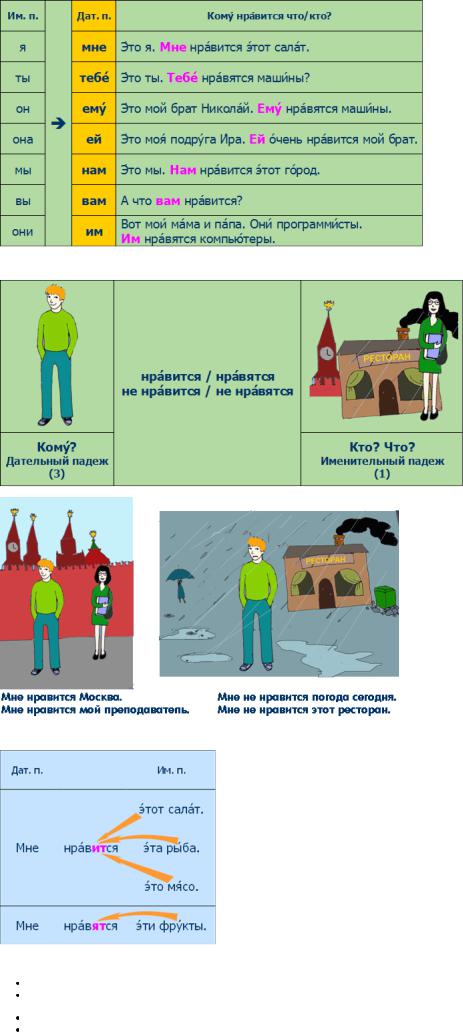
20.06.2015 |
Time to Speak Russian::Grammar Notes |
Consider the sentence structure in the following examples:
Attention!The verb form has to agree with the noun in the Nominative case.
Let's see how you can ask and answer such questions: |
|
||
– Тебе нравятся блины? |
|
|
|
́ ́ |
́ |
|
|
– Да. // Да, нравятся. // Да, мне нравятся блины. |
|||
́ |
|
́ |
́ |
– Вам нравится омлет? |
|
|
|
́ |
́ |
|
|
– Нет. // Нет, не нравится. // Нет, мне не нравится омлет. |
|||
|
́ |
́ |
́ |
http://www.speakrussian.cie.ru/time_new/eng/grammar/ |
|
|
14/59 |
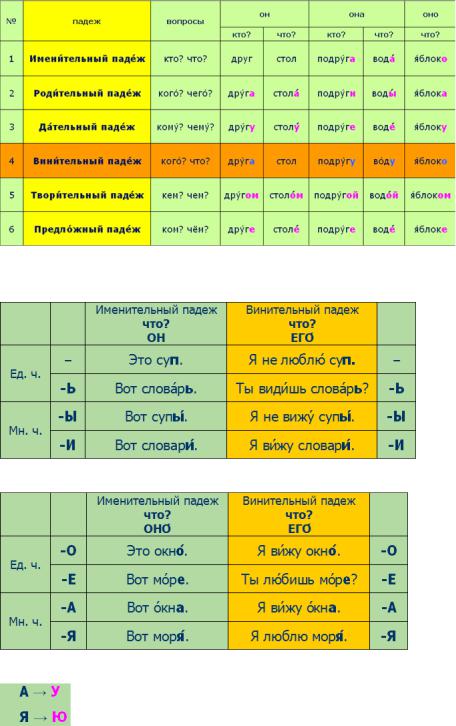
20.06.2015 Time to Speak Russian::Grammar Notes
To convey an attitude to an action using the construction with the verb "нравиться" (to like), follow the verb "нравиться" (in the fo infinitive form of the verb which indicates the action itself:
 Мне нра́вится чи́тать.
Мне нра́вится чи́тать.
 Тебе́нра́вится обе́дать здесь?
Тебе́нра́вится обе́дать здесь?  Ему не нра́вится пить во́ду.
Ему не нра́вится пить во́ду.
ACCUSATIVE CASE
A noun or pronoun in the Accusative case indicates a direct object. Verbs "читать" (to read), "понимать" (to understand), "to know love or like) will be followed by the noun or pronoun in the Accusative case. Nouns or pronouns in the Accusative case answer the q "whom?"
The question "what?" is asked when the inanimate noun serves as an object, and the question "whom?" refers to an object that is eith animal.
 – Что ты хо́чешь?
– Что ты хо́чешь?
 – Я хочу́сала́т.
– Я хочу́сала́т.
 – Кого́ты зна́ешь?
– Кого́ты зна́ешь?
 – Я зна́ю А́нну.
– Я зна́ю А́нну.
For inanimate masculine nouns, as well as neuter nouns, the Accusative case endings coincide with the Nominative case endings:
Masculine nouns
Neuter nouns:
However, for feminine nouns both animate and inanimate the Accusative case endings will be different:
http://www.speakrussian.cie.ru/time_new/eng/grammar/ |
15/59 |
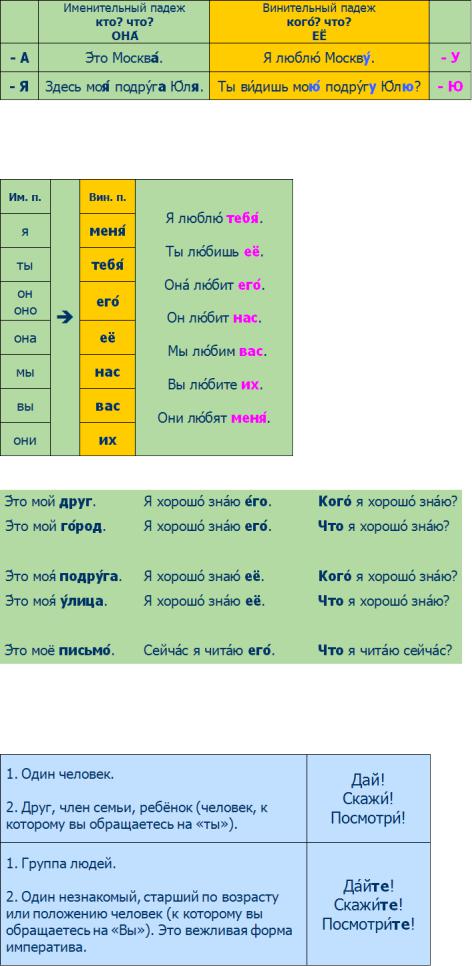
20.06.2015 |
Time to Speak Russian::Grammar Notes |
Please, note! For masculine and feminine nouns which end in "–Ь", the Accusative case endings stay the same.
To find out how animate masculine noun endings change in the Accusative case, see Lesson 5.
Personal pronouns in the Accusative case have special forms.
Compare:
IMPERATIVE
The Imperative is used to express a request or an order.
There are two Imperative forms in Russian, and the choice of a particular form depends on whom you are addressing:
http://www.speakrussian.cie.ru/time_new/eng/grammar/ |
16/59 |
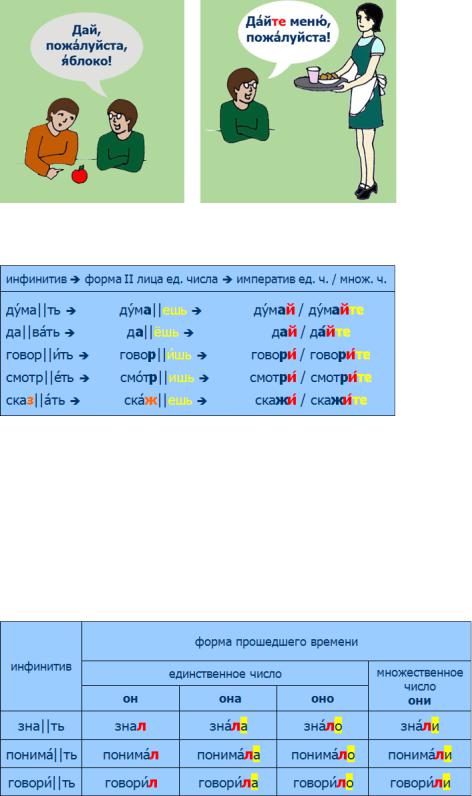
20.06.2015 |
Time to Speak Russian::Grammar Notes |
Imperative forms.
This is how the Imperative forms are constructed:
Please, remember!
If the verb stem ends in a vowel ("a", "о", "у", "и", etc.), then the suffix "Й" is added to the stem. If the stem ends in a consonant (" etc.), then the suffix "И" is added.
Verb: Past Tense
The Past tense is used to describe any action that took place in the past.
"Этот молодой человек раньше не говорил порусски, а теперь говорит". "Previously, this young man did not speak Russian b
"Маша уже говорила тебе, где можно купить сувениры." "Masha told you before where to buy souvenirs."
To form the Past Tense verbal forms: first, drop the verb Infinitive ending and add to the verb stem the Past tense suffix "л", then fo ending "а" for feminine nouns, with the ending "о" for neuter nouns, and the ending "и" for plural nouns.
Please, remember! The Past tense verbal form agrees with the noun in gender and number.
http://www.speakrussian.cie.ru/time_new/eng/grammar/ |
17/59 |
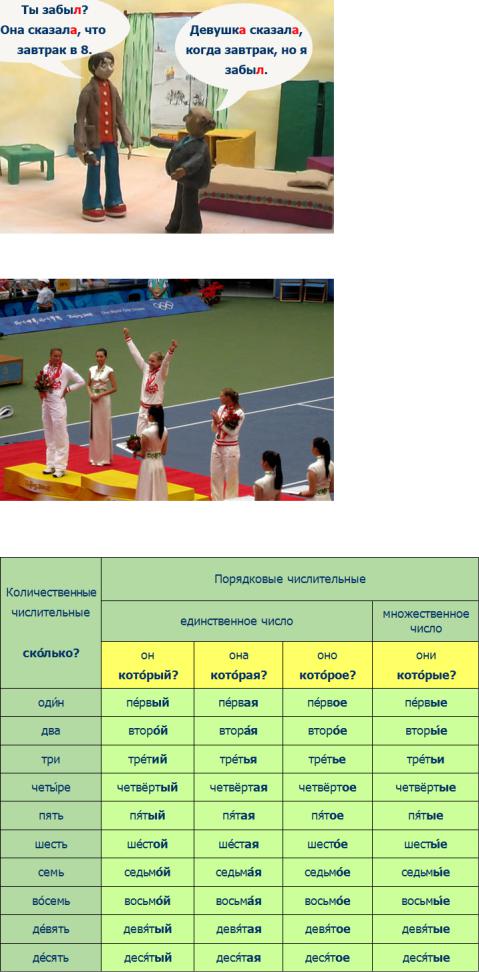
20.06.2015 |
Time to Speak Russian::Grammar Notes |
Ordinal Numerals.
The first place!
Just as adjectives, ordinal numerals have to agree with nouns in gender, number and case.
Complex sentence with the words "ПОЭТОМУ" (that's why) и "ПОТОМУ ЧТО
причина Я люблю икру. |
следствие Я ем икру |
This is a cause. |
2. Here is an effect. |
http://www.speakrussian.cie.ru/time_new/eng/grammar/ |
18/59 |
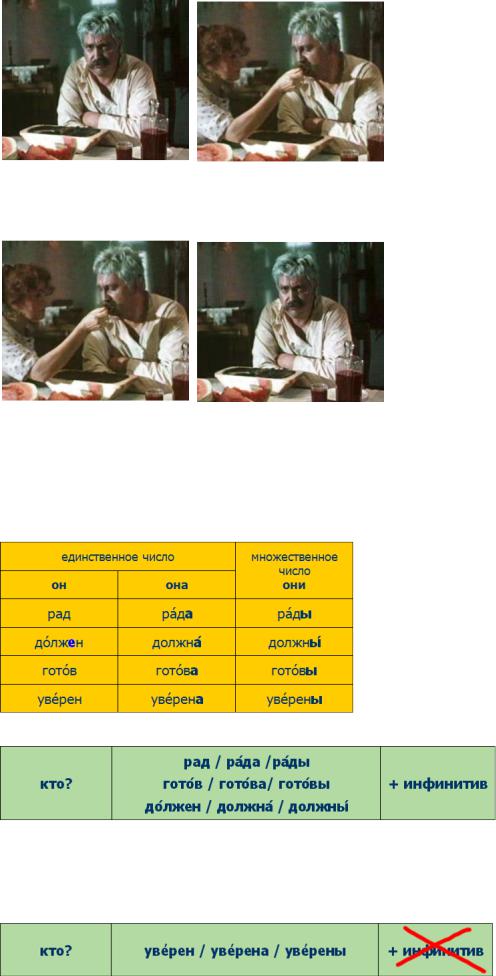
20.06.2015 |
Time to Speak Russian::Grammar Notes |
Ялюблю икру, поэтому я ем икру.
1.This is an effect.
2. Here is a cause.
Я ем икру, потому что я люблю икру.
Почему я часто ем икру? – Потому что я люблю её.
Modal words: рад (glad), уверен (sure), должен (have to), готов (ready), надо / ну
To convey an attitude to an action or event being talked about, a speaker can use special words: "должен", "рад", "уверен", "готов"
The words "рад", "уверен", "готов" are short forms of adjectives. Thus, they agree with nouns or pronouns in gender and number.
Consider the sentence structure in the following examples:
For example:
 "Антон рад видеть Анну в Москве". "Anton is glad to see Anna in Moscow."
"Антон рад видеть Анну в Москве". "Anton is glad to see Anna in Moscow."
 "Подруга должна заплатить за квартиру". "My girl friend has to pay for the apartment".
"Подруга должна заплатить за квартиру". "My girl friend has to pay for the apartment".  "Студенты готовы писать тест". "The students are ready to write a text."
"Студенты готовы писать тест". "The students are ready to write a text."
BUT!
Я уверен, что видел этот фильм.
Please, remember!
http://www.speakrussian.cie.ru/time_new/eng/grammar/ |
19/59 |
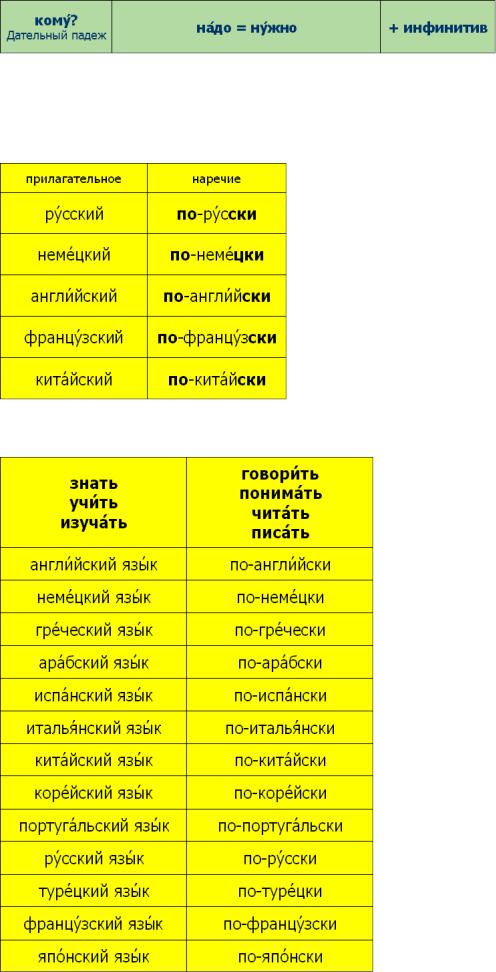
20.06.2015 |
Time to Speak Russian::Grammar Notes |
 Мне надо позвонить домой.
Мне надо позвонить домой.
 Тебе нужно заплатить за завтрак.
Тебе нужно заплатить за завтрак.  Вам нужно поменять деньги.
Вам нужно поменять деньги.
Using adverbs ("порусски" "in Russian") with verbs "говорить" ("to speak") a "понимать" ("to understand").
 Мы хорошо говорим поанглийски.
Мы хорошо говорим поанглийски.
 Друзья не пишут поитальянски, но читают поитальянски.
Друзья не пишут поитальянски, но читают поитальянски.  Иван неплохо понимает поукраински.
Иван неплохо понимает поукраински.
Accusative Case: Animate Nouns (singular)
In the Accusative case, animate and inanimate masluline nouns have different endings. For inanimate masculine nouns, the Accusati endings are the same (see Grammeer Notes to Lesson 4).
http://www.speakrussian.cie.ru/time_new/eng/grammar/ |
20/59 |
